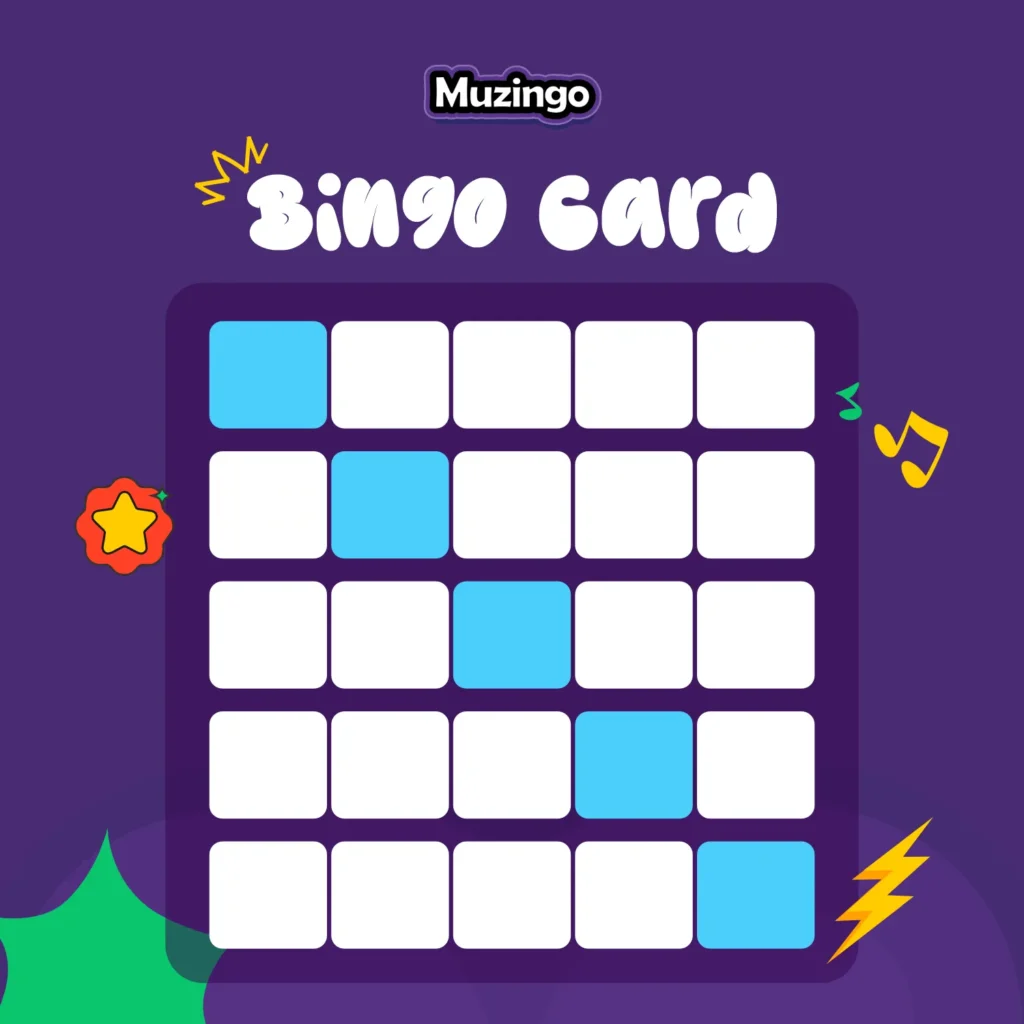Bingo has been a beloved pastime for generations, conjuring images of lively halls, daubers at the ready, and the thrill of shouting “Bingo!” when that winning combination appears. It’s a game of chance, anticipation, and friendly competition. But what if you could inject an entirely new level of energy and personal connection into this classic game?
That’s where Music Bingo steps onto the scene, offering a vibrant twist on a familiar favourite. Understanding the fundamental differences between traditional bingo and music bingo can help you appreciate the unique appeal of each and discover which might be the perfect fit for your next gathering.
For many, the idea of bingo instantly brings to mind a card filled with numbers. The caller announces a number, and if it’s on your card, you mark it off. It’s simple, straightforward, and relies on the luck of the draw. Music Bingo, however, trades those numbers for something far more engaging for music lovers: song titles.
This seemingly small shift opens up a world of possibilities, transforming the game into an auditory celebration. Let’s explore the key differences between traditional bingo and music bingo to highlight what makes each so special.
5 Differences between Traditional Bingo and Music Bingo
While both games share the core bingo structure of marking off items on a card to achieve a winning pattern, the experience and elements involved create distinct experiences. Here are the five primary differences:
1. The Core Elements of Numbers vs. Songs
This is the most significant and defining distinction. Traditional bingo cards are grids filled with randomly generated numbers, usually within a specific range (e.g., 1-75). The excitement comes from hearing the announcer call out a number and hoping it’s one you need.
It’s a test of your ability to quickly scan your card and mark off the called number. The success of traditional bingo relies purely on luck and quick reflexes.
In contrast, Music Bingo replaces numbers with song titles. The game host plays short clips of songs, and players match the song title to an entry on their unique bingo card. This introduces an element of musical knowledge and recognition. The thrill isn’t just in marking something off; it’s in recognizing the song, recalling the artist, and knowing the title.
This makes the differences between traditional bingo and music bingo a fundamental shift in how players interact with the game. The specific genres and eras featured on the cards can be tailored, making it a deeply personal and engaging experience.
For instance, a 90s hip-hop Music Bingo card will resonate differently than a country music Music Bingo card.
2. Player Engagement and Skill
Traditional bingo is largely a game of passive observation and quick reaction. While strategic seating or buying multiple cards can be considered, the core gameplay involves listening for numbers and marking your card. The skill involved is minimal, making it accessible to almost everyone.
Music Bingo, however, engages players on a more active and cognitive level. It requires listening skills, musical recognition, and a certain level of familiarity with the featured music. Players aren’t just passively listening for a number; they’re actively recalling and identifying songs.
This element of music knowledge adds a layer of personal engagement and can even spark conversations about favorite artists and songs. The differences between traditional bingo and music bingo are stark here, as music bingo fosters a more participatory and interactive environment.
For those who love music, this can be incredibly rewarding. Imagine a round of 80s pop Music Bingo where you instantly recognize a song and excitedly mark it off, perhaps even singing along. This active participation is a major draw.
3. Atmosphere and Theme
Traditional bingo halls often have a distinct, albeit sometimes quiet, atmosphere. The focus is on the game, with the occasional cheer or sigh. Themes can be applied to decorations or prizes, but the core gameplay remains the same.
Music Bingo, by its very nature, creates a more dynamic and vibrant atmosphere. The music itself becomes a central part of the ambiance.
Depending on the playlist – whether it’s upbeat pop, soulful gospel, or classic rock – the mood can shift dramatically. This makes it incredibly versatile for different types of events. A Music Bingo night featuring Afrobeat tunes will have a completely different energy than one focused on Disney soundtracks.
The differences between traditional bingo and music bingo are evident in the very soundscape of the game. It’s a party starter, a social lubricant, and a fantastic way to connect with others through shared musical tastes.
4. The Hosting Experience
In traditional bingo, the host’s role is primarily to call out numbers clearly and efficiently. It’s a functional role, ensuring the game runs smoothly.
With Music Bingo, the host can be much more of an entertainer. They can introduce songs, share fun facts about artists, or even lead singalongs. The music selection itself becomes a creative outlet for the host. A skilled Music Bingo host can read the room, adjust the tempo, and build excitement.
This interactive element is a key part of the appeal. The differences between traditional bingo and music bingo extend to the personality and engagement of the person running the game. A great Music Bingo host can elevate the entire experience.
5. Customization and Personalization
While you can have themed traditional bingo nights, the core numbers on the cards are generally standardized. Customization is limited to the surrounding elements.
Take Your Game Nights to the Next Level
Muzingo is a fun game where players listen to music tracks and match them to bingo cards — competing to win prizes with friends.
Play Muzingo FreeNo Card Required
Music Bingo offers an unparalleled level of customization. Playlists can be tailored to any theme imaginable: decades (like the 70s, 80s, 90s, or 00s), genres (rock, pop, country, hip-hop, R&B, classical, jazz), artists, movie soundtracks, holiday themes, or even specific moods.
This makes Music Bingo incredibly adaptable for parties, corporate events, fundraisers, or just a fun night in with friends. You can create a Music Bingo game that perfectly suits the tastes of your guests. This level of personalization is a significant factor in the growing popularity of Music Bingo, setting it apart from its numbered counterpart.
You can read more here.
Why Music Bingo is Taking Over
Given these differences, it’s easy to see why Music Bingo is gaining so much traction. It appeals to a broad audience, from seasoned bingo players looking for a fresh challenge to music enthusiasts eager to test their knowledge. It’s a fantastic way to bring people together, creating shared memories and fostering a sense of community.
Platforms like Muzingo are making Music Bingo more accessible than ever. You can host your own games or join public ones, all with curated playlists designed for maximum fun.
Whether you’re a fan of 90s nostalgia, country melodies, gospel harmonies, or the infectious rhythms of Afro beats, there’s a Music Bingo experience waiting for you. The ability to connect with others over shared musical passions makes it a truly special experience. Learn more about how Muzingo can transform your next event at Muzingo.
Frequently Asked Questions about Music Bingo
Is Music Bingo difficult to learn?
Not at all! The core concept is the same as traditional bingo. You get a card, and you mark off items as they are called. In Music Bingo, instead of numbers, you’re matching song titles to song clips. If you can recognize a song and know its title, you can play Music Bingo. It’s designed to be intuitive and fun for everyone.
What kind of music can I expect in a Music Bingo game?
That’s the beauty of Music Bingo – the possibilities are endless! You can find games dedicated to specific decades (like the 80s or 90s), genres (pop, rock, country, hip-hop, R&B, EDM), artists, movie soundtracks, TV show themes, and even niche categories. Muzingo offers a wide variety of playlists to suit every musical taste.
Do I need to be a music expert to play?
While a good ear for music and some knowledge of popular songs will definitely enhance your experience, you don’t need to be a music expert. Many Music Bingo games are designed with popular hits that most people will recognize. Plus, part of the fun is discovering new music or rediscovering old favorites.
How does Muzingo make hosting Music Bingo easy?
Muzingo simplifies the entire process. You can create your own custom games with playlists from their extensive library or choose from pre-made options. The platform handles card generation, song playback, and even prize management, allowing you to focus on enjoying the game with your guests.
It’s a hassle-free way to bring the fun of Music Bingo to any occasion. You can explore hosting options at Muzingo or join a game directly here.
What are the main differences between traditional bingo and music bingo?
The primary differences lie in the core element (numbers vs. songs), the level of player engagement and required skill (passive listening vs. active recognition), the atmosphere created (functional vs. vibrant), the hosting experience (announcer vs. entertainer), and the potential for customization (limited vs. extensive).
Music Bingo leverages the universal appeal of music to create a more dynamic and personalized game experience.
Conclusion
Both traditional bingo and music bingo offer unique forms of entertainment, but the differences between traditional bingo and music bingo highlight a modern evolution in game design.
Music Bingo takes the familiar framework of bingo and infuses it with the power of music, creating an experience that is engaging, personalized, and incredibly fun. It taps into our shared love for melodies and rhythms, turning a simple game into a vibrant celebration of sound and connection.
Whether you’re looking to liven up a party, connect with friends over shared playlists, or simply find a new way to enjoy your favorite tunes, Music Bingo, especially with platforms like Muzingo, offers an exciting and accessible option.
It’s a game that proves you don’t need to be a math whiz to win – just a music lover with a keen ear and a good playlist.
What musical genre or decade would you love to see featured in your next Music Bingo game?
Ready to experience the fun for yourself? Visit Muzingo to learn more and start your Music Bingo adventure!



